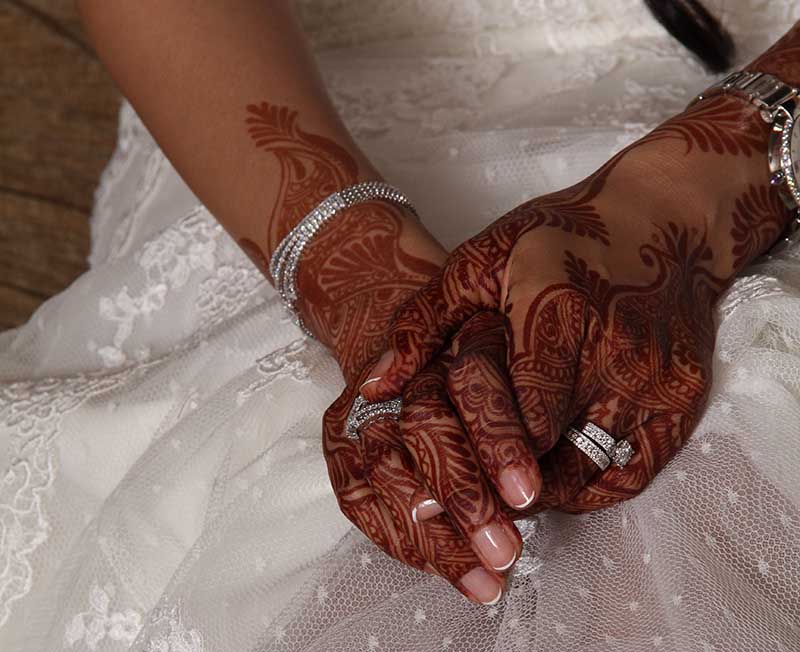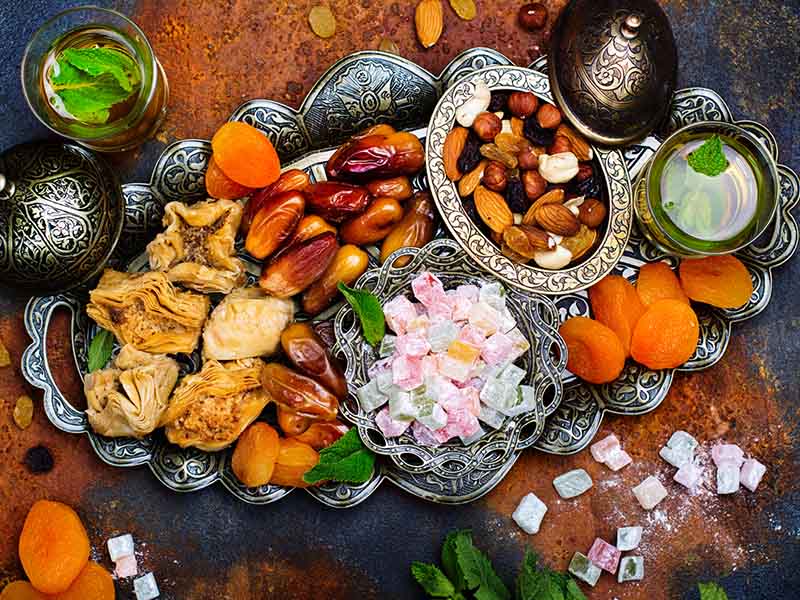
By Karin Louzado
Travel Writer6 Dec 2019 - 6 Minute Read
Glowing in the spotlight, Asma enters the catwalk in her dazzling Addahbia (wedding dress), hands covered with intricate patterns from yesterday's henna night. Cameras flash, high-pitched voices ululate, the 600-head ballroom jumps to life at her arrival. “Mashallah, you look stunning,” I whisper, while planting four kisses on her right cheek.
I feel privileged to be a part of this traditional celebration. Young, single girls parade around, wearing gorgeous dresses and designer jewelry, hoping to catch the keen eye of their future mother-in-law. Around midnight, a change of music signals us to cover our heads, and the groom joins the lavish celebrations. It's the first and only time I get to meet him.

Candid talks in the changing room
Only months earlier, she'd dropped the bomb. “I'm counting on all of you to come to the wedding,” Asma said, as she exchanged her vibrant organza skirt for a gracious black abaya (full-length dress). I stopped folding away my own veil and stared at her incredulously. “I didn't know you were seeing someone,” I said. “Ah, no, habibti (my dear) – arranged marriage,” she stated, and with that, she threw her shayla (scarf) over her hair and left the dance studio.
I was stunned. This was my friend Asma, a 32-year old Emirati woman who'd been entertaining us for years with stories about her mother trying to marry her off. Highly educated and well-traveled, she’s someone I never imagined submitting to marrying a stranger. She didn't come from a conservative family, either. Asma often went uncovered, and her parents supported her in her pursuit to master belly dancing, often perceived as erotic and forbidden.
I'd met Asma eight years earlier in class. I'd moved to Dubai for work, and was eager to immerse myself in Arabic culture. I'd taken up belly dancing, hoping to connect with the local community and looking for a deeper understanding of the music and history. I wasn't disappointed.
“We're going to France for the honeymoon. And I already told him I'm not bringing my abaya, he's okay with that." Asma said, a week after her wedding announcement. I was still in denial. Of course, I'd been aware that most marriages in the UAE were arranged by parents who pick a suitor for their children. I'd also learned that eligible Emiratis have a say in the matter, being able to refuse if they feel it's not a right match. Asma had refused many times. Why she'd accepted this time was unclear to me.
Private revelations
Dressed in our colorful Ramadan gowns, we're gathered for Suhoor (early morning meal) at Asma's house. I hadn't seen her since celebrating her first wedding anniversary three months ago – her pregnancy prevented her from coming to class. The table in front of us is laden with Arabic sweets; baklava, ma’amoul and other tasty desserts coated with honey, pistachios, and almonds.

“Tell me, habibti, how is married life treating you?” I ask. Asma smiles. “Alhamdulillah (praise be to God), I'm happy. And relieved. Because unfortunately, even to this day, as a woman in Dubai, you've only made it if you are married. No matter how successful you are.” She continues, “even if you're divorced, it's better than being single. It shows that at least, at one point in your life, you were wanted by someone. You were chosen by someone."
Her story isn't unique to the Middle Eastern world. It reminds me how society judges Western women like me – because we keep working after having children, because we don't want to have children at all. Having to defend ourselves if we don't follow the norm. The continuous pressure to conform is overwhelming.
The glowing mother-to-be continues, "as much as we encourage women, in society we still look down on those who aren't married yet. I was always judged. Even my best friends would look at me and think, ‘what's wrong with her?’.”
I swallow hard. I'd been one of those judgemental friends – because she had chosen an arranged marriage over love. Because she hadn't followed my norm.
Common ground
The girls have organized a farewell party. After 13 years in Dubai, I'm moving back home to the Netherlands. While we sip our fancy coffees, we reminisce about the moments we've shared together. So much has changed since the first time we entered that dance studio.
Watching our children play together, we share our wishes for the future generation. “I truly wish they'll find somebody compatible, like I did.” Asma says. She adds: “I hope my husband and I are good role models. Love is important, but most of all I hope they'll find a person who treats them with respect.”
Love and respect. I can’t help but laugh at the irony of us, two women representing such different cultures, but seeking the exact same things in life. Embarrassed, I remember my reluctance to accept Asma's choices. Our friendship had taught me that my perception had been clouded – I'd been measuring her by my personal standards. Asma had made me drop my veil.
Discover similar stories in
transformation
Travel Writer
Karin is a family travel expert who explored over 50 countries without losing her wallet, mind, or kids. Believing the world is our classroom, Karin drags her family across the globe in search of humbling life lessons and culinary highlights.




No Comments